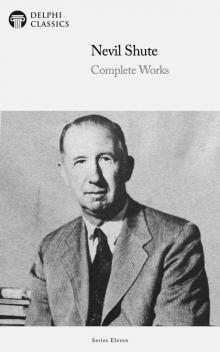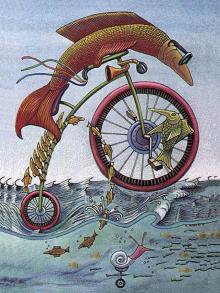- Home
- Nevil Shute
An Old Captivity Page 14
An Old Captivity Read online
Page 14
The pilot passed a hand across his eyes, and turned to her. “I should think we’d all be glad to get to bed. It makes a long day, when you’re flying for this length of time. I’m sorry I made such a rotten landing.”
Lockwood said: “It was bumpy, but you had very little room.”
“I know. I didn’t like the look of the swell outside the harbour.”
They came slowly to the slipway. Men in waders were waiting to receive them; the machine was pulled up to the water’s edge. One by one they got down on the float and so to shore. The ground felt heavy to their feet, their knees were weak.
Ross turned to the Lockwoods. “Would you go on up to the hotel and get our rooms?” he said. “I’ll be along as soon as I’ve seen everything all right here.”
The don hesitated. “Isn’t there anything that we can do to help?”
“I don’t think so, thanks. There seem to be heaps of people here, and Mr. Sorensen speaks English. If you’d go up and tell them to keep some dinner hot for us … I’ll be along in about half an hour.”
It was much longer than that. The general opinion was that it was going to blow hard during the night. Ross could not leave till he had seen that the machine was pulled up well clear of the high tide, and firmly lashed down on the travelling cradle. There was no shelter available to house the seaplane. He spent a long time supervising the arrangements, till finally he was satisfied that she was safe.
It was between half-past eight and nine when he got back to the hotel. The Lockwoods were waiting for him in the lounge; they had not dined. He went and had a hurried wash, then joined them in the dining-room. Lockwood said: “What are you drinking, Mr. Ross?”
“I think I’ll just have water.”
Alix said unexpectedly: “Are we going on to-morrow, Mr. Ross?”
“I’m afraid we can’t, Miss Lockwood. After all that weak running, I must have a look at the engine. I’ll have to take a couple of the pots off, I expect.”
She nodded. “If we’re not going to fly, you can have a whisky and soda. It’ll do you good.”
“All right.”
Lockwood ordered him a double whisky; he drank it, and felt better. In the relaxation following the strain of the flight, the meal passed in a dream of fatigue. Over the coffee the eyelids dropped slowly down over his eyes, his head sagged. Alix, sitting beside him, nudged him with her elbow; he straightened up again.
She said: “You’d better go to bed, Mr. Ross.”
He passed a hand across his eyes, and smiled. “I’m so sorry. I was half asleep.”
The don said: “I should go on up to bed. I’m going in a minute. So is Alix.”
“I believe I will—before old Sorensen comes in and catches me.” He got to his feet, steadying himself by the table. “Good night, Miss Lockwood. Good night, sir.”
He went out through the lounge and up the staircase. They watched him as he went. Lockwood said: “I think our pilot’s had about as much as he can stand.”
His daughter said: “It was the party last night, Daddy. It was cruel, that. He can’t have had nearly enough sleep.”
The don nodded. “It would have been very difficult to get out of,” he said mildly. “Still, I’m very glad to hear his engine needs attention. It won’t do us any harm to wait here quietly for a day or two, and rest a bit.”
She laughed shortly. “Do you think you’ll get him to rest if his engine needs attention?”
Ross was in bed by ten. He slept immediately, a sleep of stunned insensibility. But by two o’clock he was awake again. In Reykjavik in summer there is no real darkness; his room was full of a half-light. He lay in bed, half sleeping and half waking, with a restless mind. He’d made a proper muck of things. Lord knew what sort of state he would find the engine in. The exhaust valves must be burnt out—probably the seatings, too. True, he had a set of new valves with him, just for this contingency But if the seatings were destroyed, as they must be, the cylinders would have to go back to Detroit before the flight could continue. The pistons might be burnt as well. He rolled over on his pillow, sick at heart. He’d made a frightful mess of it! This flight was the big chance of his life to make a reputation—and he’d thrown it all away. He ought to have gone down at the first sight of clouds and crept in at five hundred feet between the pack ice and the cloud ceiling. He’d have got to Angmagsalik all right that way. He ought to have turned back earlier, at the first sign of doubtful weather. He ought never to have started. He ought to have done anything but what he had done.
He rolled over again, and the memory of the ice-cap came to him. Gross, unpardonable carelessness! He could still see the snow-slopes close beneath his floats—to think that anyone could be so reckless as to take them for a cloud. He had put them all within an ace of a crash—and such a crash! He lay in bed and felt the splintering impact, the violence of the pressure on his seat as the machine turned over, the hot blood welling out over his eyes, the snow cold on his hands. He might have killed them all. If they had lived through the crash they would have been there now, lying in the snowfield far from any help, freezing to death. Lockwood, who had given him the job because he had believed in him. Alix, who had helped him all she could, and talked to him to help him keep awake, who had a lovely figure when her things were wet …
Alix …
He roused himself, got out of bed, and had a drink of water.
He got back into bed and lay there wide awake, his active, restless mind at full pressure. He wouldn’t have to send the cylinders to Detroit. They could be done at Amsterdam. If he got one off first thing in the morning for inspection … he could get the lot off before night. When he knew the worst, he could cable Amsterdam and make arrangements. If only there were a boat—a trawler, anything leaving Iceland. If he could get to the north of Scotland and get on the air line, he could fly to Amsterdam. Say five days—six days—from Reykjavik to Amsterdam, two days to replace the burnt seatings, six days back. Three days to reassemble the engine and test the machine. Three weeks’ delay in all. The season would be far gone, but not irretrievably. They would get going again in the first week in August.
That was, if Lockwood was prepared to trust him again after a mess like this …
He dozed and lay awake intermittently for the rest of the night, restless and distracted. At six o’clock he got up, washed his face and dressed, and went downstairs. The porter of the hotel made him a cup of coffee; he drank it, and felt better. He went out into the town and found the boatman, and made him understand that he required a table. They got one from the boatman’s house and carried it through the streets to the trawler slipway. Ross set it up beside the engine, tied a blanket down on it, got a bucket of paraffin, and began his work.
At half-past nine Lockwood rapped on his daughter’s door. “I’m getting up, Daddy,” she said. “I’ll be down in about ten minutes.”
She met him in the lounge. “Where’s Mr. Ross? Is he still in bed?”
Her father shook his head. “He seems to be down with the seaplane. The porter says he had a cup of coffee and went out at about a quarter-past six.”
“But that’s quite absurd! He can’t possibly have had enough sleep!”
“He’ll have had seven or eight hours.”
“Has he had any breakfast?”
“The porter said he had a cup of coffee.”
Alix said impulsively: “We can’t let him go on like this. I’m going down to fetch him up to breakfast.”
Her father stopped her. “Let him do his work in his own way,” he said. “Come on and eat your own breakfast. Then we’ll go down and see what he’s doing.”
She went through with him into the dining-room and ate a hurried meal.
Down on the slipway Ross was standing upon a trestle, carefully drawing the master cylinder off its piston. He carried it down to the ground and laid it on the table, then went up on to the trestle again and wrapped clean rags around the piston and the hole. He got down, and began to dismantle the valv
e mechanism on the cylinder.
A quarter of an hour later he was lighting a cigarette smeared with paraffin, and staring in wonder at the bits and pieces laid out on the table, still dripping from their wash.
There was no damage to that cylinder, at any rate. The piston was unharmed, the seatings were as bright as when they left the factory. The exhaust valve was a little red in colour but quite good; it would not even need re-facing. So far as he could see, in fact, that cylinder was in good condition.
There was a movement behind him; he turned, and there was Lockwood and the girl. He smiled at them. “’Morning,” he said, “I’ve just been having a look at this.”
To Lockwood, he was looking drawn and tired. The don said: “Is there much damage to the engine?”
The pilot blew a cloud of smoke and laughed, a little awkwardly. “Nothing at all to this cylinder. I want to take another one off as a check, but it looks as if it’s all a mare’s nest, sir.”
Alix said: “Have you had any breakfast, Mr. Ross?”
“Not yet. I wanted to see how matters stood down here.”
“Won’t you leave it now, and come and have your breakfast?”
He shook his head. “I’m quite all right, Miss Lockwood. I’d rather take another pot off right away, and make sure. I’ll be through by lunch time. Then if everything’s all right, I can start reassembling this afternoon.”
Lockwood said: “Can we help you at all, Mr. Ross?”
“I really don’t think there’s anything that you could do, sir. I may want a hand this afternoon, but I can get a chap from the garage.”
Alix said: “You won’t be able to talk to him.”
He smiled. “You’ll have to come and translate for me again.”
They went away after a little time, and he went on with his work. An hour later another cylinder lay dismantled on the table; it was in similar condition to the first. There was no damage to the engine at all.
The pilot lit another cigarette. With the relief from the tension of anxiety he now felt curiously tired; it was as if all energy had been drained from him. He now felt that he had been foolish. He had been worrying himself unnecessarily, scaring himself with the bogies that did not exist. He should have been able to set his mind at rest and have a good night’s sleep, instead of worrying himself crazy all the time he was in bed. It was no good going on like that. Great flights were made by men who kept their heads.
He reassembled the valve gear of both cylinders and put the cylinders and the tools carefully on the floor of the cabin. It was nearly time for lunch; he locked the cabin door and went up in to the town. He found a chemist’s shop without much difficulty, and asked for aspirin.
The man shook his head. “I have not aspirin. I have others, better. But not aspirin. You have pain?”
Ross said: “I wanted it to help me sleep.”
“Ah, you cannot sleep! I have here what is good.” He went to a drawer and produced a little bottle of tablets. “This good for you if you cannot sleep.”
Ross took it doubtfully, and examined it. It was the product of a German firm at Hanover, and was called Troxigin. “It is like aspirin,” the chemist said. “For sleep it is better.”
“All right,” said Ross. “I’ll take some of these.” The bottle held twenty-five tablets. “But I shall want more than this. Have you got a bigger bottle?”
The man looked at him doubtfully. “One only,” he said. He held up one finger. “One each night. It is not good to take more.” He took the bottle and showed Ross the instructions, printed in German. “One only.”
The pilot nodded. “I understand. But I’d better have some more. There are two other people with me, and we are going on to Greenland.”
“Ah—to Greenland.” The words explained everything to the chemist; he made no further demur. He sold Ross a bottle of a hundred tablets; the pilot slipped it in his pocket and went back to the hotel for lunch.
He met the Lockwoods in the lounge and had a tomato cocktail with them. Alix said to him:
“At half-past four there is a meal called tea, Mr. Ross. I’d like you to remember it.”
He smiled: “All right. I’m a good deal happier now than I was this morning.”
“It’s all right, is it?”
He nodded. “Quite all right. I’ll get those pots put back this afternoon and finish off to-morrow morning. Then we can take her up for a short test flight to-morrow afternoon, fill her up, and get away next day if the weather’s decent. Have another crack at it.”
They lunched; he had a good appetite, and ate well. He was not surprised to feel sleepy as he left the dining-room; he had to force himself to go and work.
Alix said: “I’ll come along this afternoon, Mr. Ross, if I may.”
He said: “That would be very nice, Miss Alix. But don’t if you’ve got anything else to do. I’ll have to get a man from the garage.”
“What sort of help do you want?”
“Oh, only somebody to hold things for me. I wouldn’t let a garage hand do any work upon the engine.”
“Well, I can hold things.”
He looked doubtful. “I’m afraid you’ll get very dirty.”
“I don’t mind.”
She went down with him, and they worked together all afternoon upon the engine. Each cylinder in turn was cleaned with loving care and smeared internally with oil. Then Ross got up upon the trestle, undid the rags, cleaned and oiled the piston. Then Alix handed up the heavy cylinder to him; he held it while she got up on to the trestle by him. Then she held it while he delicately persuaded the piston to enter it, and slid it down gently on to its seating on the crank-case. Bolts were put on finger-tight; then the whole process was repeated with the other cylinder. Finally the engine was turned over with the propeller, and the bolts were tightened down and locked.
In the end, Ross got down and offered her a dirty cigarette. She took it with dirty fingers. “I don’t smoke much,” she said. “But then, I don’t do this much, either.”
He lit it for her. “Do you know what time it is?”
She blew a cloud of smoke, and shook her head.
“Five o’clock. We’re late for that tea you were talking about.”
“It doesn’t matter. Daddy’s gone to the Cathedral with Herr Sorensen.”
The pilot stretched himself. “I don’t feel like doing any more to-night. I’ll finish off in the morning. Let’s pack up.”
“All right. Have you written to Aunt Janet?”
He looked at her, startled. “How did you know about Aunt Janet?”
“You told me about her.” She was amused. “Yesterday, when we were flying back.”
“So I did. I had such a lot to think about yesterday, I’d quite forgotten that. I told you all about her, didn’t I?”
She nodded. “I think you might write and let her know how we’ve got on.”
He said: “I’ll send her a cable to-night.”
“Write her a letter, too. She’ll like to have that, and there won’t be any opportunity in Greenland.”
“All right.”
He locked up the machine and saw that everything was snug for the night. They walked back to the hotel, tired and dirty. Lockwood had not returned; presently they were sitting together in the lounge for tea.
The girl got up presently and went and fetched a pad of cable forms. “Here you are,” she said. “Write it out now, and we’ll walk out and send it off.”
He smiled, and took the forms. “Anyone would think she was your aunt, not mine.”
“Well, if it wasn’t for me she wouldn’t be getting a cable to-night, Mr. Ross.”
“Shall I tell her that?”
She laughed. “If you like.”
Two hours later the messenger delivered a telegram at the little house in Guildford. Aunt Janet took it into the kitchen, put on her spectacles, and opened the buff envelope. The message read:
ARRIVED REYKJAVIK WEDNESDAY GOING TO ANGMAGSALIK TO-MORROW ALL WELL MISS LOC
KWOOD SENDS REGARDS.
DONALD.
She read this in silence with pursed lips. It was good news that all was well, and they had got to Iceland safely. But why did the lassie send her regards, and above all why did Donald waste good money in saying so in a cable at sevenpence or eightpence a word, maybe more? It seemed a wicked waste. She put the cable on the mantelpiece, and set about making a little milk pudding for her supper. Presently she picked the cable up again, and stood it up so that she could see it.
“He never was one for saving money,” she muttered to herself presently. “I doot he’s getting fond of her.”
That night Ross went to bed early, soon after dinner, having posted a short letter to Aunt Janet. He opened the bottle of Troxigin in his room and took one of the tablets with a glass of water. He got into bed, not feeling very sleepy, but within ten minutes he was sound asleep. He slept quietly and well the whole night through, and did not wake until the morning call.
He lay awake for a few minutes before getting up, luxuriating in the feeling of freshness that he had gained by his sleep. He really had had a wonderful night, the best night’s sleep that he had had for months. He realised that it was wholly due to the Troxigin, and was grateful to the drug. These German chemists knew their stuff all right …
That day was not a hard one. He was down at the machine by half-past eight; by eleven o’clock he had finished his assembly work, put in a hundred gallons of fuel, and sponged out the bilge-water that had leaked into the floats. Then he started up the engine with the seaplane still lashed down upon the slipway, ran it for twenty minutes, stopped it, and made a careful inspection. Finally he put on the engine cowling and made all ready for flight. Then he went back to the hotel for lunch.
“I’ll take her up for a short test this afternoon, sir,” he said to Lockwood. “Then I’ll put her back on the mooring and fill her up with petrol. Would you like to come up with me?”
“I think Mr. Sorensen has something that he wants to show me at a place called Keflavik.”
Alix said: “I’d like to come with you, Mr. Ross. I don’t want to go to Keflavik.”

 On the Beach
On the Beach Slide Rule
Slide Rule A Town Like Alice
A Town Like Alice The Far Country
The Far Country Pied Piper
Pied Piper Round the Bend
Round the Bend An Old Captivity
An Old Captivity Mysterious Aviator
Mysterious Aviator The Breaking Wave
The Breaking Wave Marazan
Marazan Lonely Road
Lonely Road Pastoral
Pastoral No Highway
No Highway Stephen Morris and Pilotage
Stephen Morris and Pilotage Complete Works of Nevil Shute
Complete Works of Nevil Shute Most Secret
Most Secret Beyond the Black Stump
Beyond the Black Stump The Rainbow and the Rose
The Rainbow and the Rose The Chequer Board
The Chequer Board Trustee From the Toolroom
Trustee From the Toolroom Ordeal
Ordeal Stephen Morris
Stephen Morris